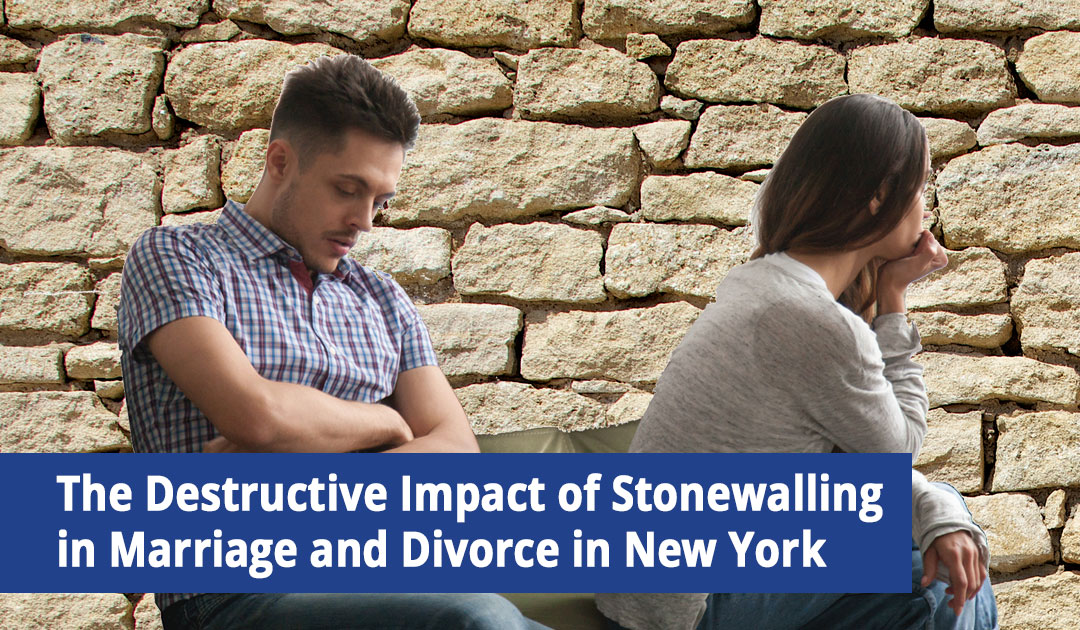The Destructive Impact of Stonewalling in Marriage and Divorce in NY

Stonewalling is when one partner in a relationship refuses to communicate or cooperate with the other. This behavior can lead to significant problems in a marriage and is often a precursor to divorce. It can often lead to considerable issues that complicate the divorce itself. When you understand the impact of stonewalling you can recognize the signs and take steps to address it before it destroys your relationship and marriage.
What is Stonewalling in Marriage?
Stonewalling occurs when one partner shuts down during a discussion or refuses to engage in conversation. This can manifest as silent treatment, avoiding eye contact, or physically leaving the room. The stonewalling partner may appear indifferent or unemotional, creating a barrier to resolving conflicts and communicating effectively.
Why Do People Stonewall in a Relationship?
There are several reasons why someone might stonewall in a relationship:
- Emotionally Overwhelmed: When faced with intense emotions, some people shut down as a coping mechanism.
- Avoidance of Conflict: By stonewalling, a person can avoid confronting difficult issues or conflicts.
- Power and Control: Stonewalling can be a way to exert control over the relationship by refusing to engage.
The Impact of Stonewalling in a Marriage
Stonewalling can have a destructive impact on a marriage. It creates a communication barrier and prevents the resolution of conflicts, leading to a buildup of unresolved issues. If left unresolved, these unsolved issues can lead can build to a lack of trust, increased resentment, emotional disconnection and eventually, the end of the relationship and the marriage.
Erosion of Trust
Trust is the foundation of any healthy relationship. When one partner consistently stonewalls, it erodes trust and fosters feelings of abandonment and neglect. The non-stonewalling partner may feel unimportant and unsupported, which can lead to emotional distance. Over time, this erosion of trust can lead to …
Increased Resentment
Over time, stonewalling can lead to increased resentment. The non-stonewalling partner may feel frustrated and helpless, unable to resolve ongoing issues in the relationship. This resentment can fester and grow, causing further harm to the relationship. Eventually, the partner being stonewalled can no longer communicate with their spouse and feels …
Emotional Disconnection
Stonewalling creates an emotional disconnect between partners. Without open communication, it becomes difficult to understand each other’s needs and emotions. This lack of emotional connection can lead to feelings of loneliness and isolation within the marriage. When at least one partner feels lonely and isolated they begin to question the validity of the marriage. They may feel they no longer have a partner, which was the whole point of getting married in the first place. At that point, they feel the next logical step is divorce so that they can feel free to find the emotional support and connection most people crave.
The Role of Stonewalling in Divorce
Stonewalling is a significant factor in many divorces. When communication breaks down and issues remain unresolved, it can create an environment of hostility and dissatisfaction. This hostility and dissatisfaction in a marriage naturally leads one to want to escape such a toxic environment through dissolution of the marriage.
How Stonewalling Impacts Divorce in NY
In some cases, stonewalling can complicate the divorce process in New York. For example, if one partner refuses to communicate or cooperate, it can delay legal proceedings and make it more challenging to reach a fair settlement. This can result in increased legal fees and prolonged emotional stress. If one person in the divorce refuses to address the issues that need to be resolved in divorce, including equitable distribution of assets and debts, child support, child custody, spousal support, visitation, etc., no progress is made and the divorce case drags on and on, with no progress toward resolution. This drives up legal fees as the divorce attorneys attempt to resolve the issues between the parties to the divorce.
One method of alternative dispute resolution that might help remove the stonewalling obstacle to your divorce is mediation. In divorce mediation, a neutral third-party divorce mediator can help a divorcing couple communicate and negotiate with one another about the important matters that need to be settled during the divorce process in NY.
Stonewalling’s Impact on Children
If a couple has children, stonewalling can negatively impact them as well. Children may sense the tension and emotional distance between their parents, leading to feelings of insecurity and anxiety. In some cases, children may blame themselves for the conflict, which can have long-term effects on their emotional well-being.
Financial Strain of Stonewalling
Stonewalling can also lead to financial strain during a divorce. Refusing to communicate or cooperate can result in costly legal battles and prolonged court proceedings. This financial stress can add to the emotional burden of divorce, making it even more challenging for both parties.
How to Address Stonewalling in a Marriage
Addressing stonewalling requires effort and commitment from both partners. Here are some steps to take:
#1. Recognize the Signs
The first step in addressing stonewalling is recognizing the signs. If you notice that your partner is shutting down during discussions or refusing to engage in conversation, it may be a sign of stonewalling.
#2. Open Communication
Encourage open and honest communication in your relationship. Create a safe space where both partners feel comfortable expressing their feelings and concerns without fear of judgment or criticism.
#3. Seek Professional Help
Sometimes, stonewalling is a deeply ingrained behavior that requires professional intervention. Couples therapy or counseling can provide a neutral space for both partners to express their feelings and work toward resolving conflicts.
#4. Practice Active Listening
Active listening involves fully focusing on what your partner is saying, without interrupting or thinking about your response. Active listening can help create a more supportive and understanding environment, making it easier to address the underlying issues.
#5. Set Boundaries
Establish clear boundaries for communication. Agree on times to discuss important issues and set guidelines for how to handle conflicts. This can help prevent stonewalling and create a more structured approach to resolving problems.
Take Steps Now to Address Stonewalling
Stonewalling is a destructive behavior that can have significant negative impacts on a marriage and often leads to divorce. By recognizing the signs of stonewalling and taking steps to address it early, couples may be able to improve their communication and work toward resolving conflicts. Whether through open communication, active listening, or seeking professional help, addressing stonewalling is crucial for maintaining a healthy and supportive relationship. If left unaddressed, stonewalling can lead to emotional disconnection, increased resentment, and ultimately, the breakdown of the marriage. By taking proactive steps to address this behavior, couples can strengthen their bond and create a more fulfilling partnership.
What to Do If Your Spouse is Stonewalling in Your Divorce
If your spouse is stonewalling in your divorce and dragging it our unnecessarily, it’s important to have an experienced team of divorce attorneys on your side. The divorce and family law attorneys at Hornberger Verbitsky, P.C. have decades of experience dealing with spouses who are trying to drag out the divorce process by stonewalling. We have proven strategies in place to encourage your partner to engage in the divorce process that can help to resolve your divorce sooner and at less expense. Contact us at 631-923-1910 or fill in the short form on this page to schedule your free consultation and case evaluation to learn how we can help.
~ Paul Carmichael
GET YOUR FREE CONSULTATION TODAY Call 631-923-1910 or fill in the form below

Horberger Verbitsky, P.C. partners Robert E. Hornberger, Esq. and Christine M. Verbitsky, Esq.
Get your complimentary consultation and case evaluation with our experienced attorneys today. Your attorney will describe the many options available and determine together which is the right solution for you. By the end of this conversation, we’ll all understand how we can best help you to move forward.
No Cost or Obligation
There is no cost or obligation for this initial consultation. It is simply an opportunity for us to get to know each other, answer your questions and learn if Hornberger Verbitsky, P.C. is right the right law firm for you. Give us a call at 631-923-1910 or fill in the short form below for your free consultation and case evaluation. All Fields Are Required
About the Author
Robert E. Hornberger, Esq., Founding Partner, Hornberger Verbitsky, P.C.
- Over 20 years practicing matrimonial law
- Over 1,000 cases successfully resolved
- Founder and Partner of Hornberger Verbitsky, P.C.
- Experienced and compassionate Long Island Divorce Attorney, Family Law Attorney, and Divorce Mediator
- Licensed to practice law in the State of New York
- New York State Bar Association member
- Nassau County Bar Association member
- Suffolk County Bar Association member
- “Super Lawyer” Metro Rising Star
- Nominated Best of Long Island Divorce Attorney four consecutive years
- Alternative Dispute Resolution Committee Contributor
- Collaborative Law Association of New York – Former Director
- Martindale Hubbell Distinguished Designation
- America’s Most Honored Professionals – Top 5%
- Lead Counsel Rated – Divorce Law
- American Institute of Family Law Attorneys 10 Best
- International Academy of Collaborative Professionals
- Graduate of Hofstra University School of Law
- Double Bachelor’s degrees in Philosophy, Politics & Law and History from SUNY Binghamton University
- Full Robert E. Hornberger, Esq. Bio














